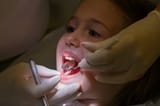Reform would address WI provider shortage, particularly for children on Medicaid
CONTACT: Michael Jahr, Badger Institute vice president, at 262-442-5208 or at Michael@badgerinstitute.org.
Feb. 12, 2019 – The Badger Institute applauds Gov. Tony Evers’ focus on creation of a dental therapist license, a policy change that would address Wisconsin’s shortage of dental care providers and improve oral health care for hundreds of thousands of children with dental benefits through Medicaid.
“We are pleased to see Gov. Evers’ commitment to increasing dental care for Wisconsin’s residents who need it most,” said Badger Institute President Mike Nichols. “We’ve found that too many Wisconsin residents, especially in rural areas, are without access to a dentist. Dental therapists have been a proven solution to this crisis in other states, and we’re confident they can have the same impact here as well.”
According to 2018 research from the Badger Institute, Wisconsin ranks last in the nation for providing oral health care to the more than 550,000 children with dental benefits through Medicaid. More than 90 percent of Wisconsin’s 72 counties have at least one geographical area experiencing a shortage of dental providers. In 2017, 1.5 million residents (more than a quarter of the state’s population) lived in areas designated by the federal government as dental care shortage areas.
Dental therapists – mid-level providers similar to nurse practitioners and physician assistants in the medical field – can provide a free-market solution to the problem without additional burdens on taxpayers. Therapists work under the supervision of dentists, and since they can provide routine care at a lower cost, they are able to serve more low-income patients. In Minnesota, dental therapists have freed up time for dentists to focus on more complex procedures that generate more revenue.
Licenses for dental therapists were implemented in Minnesota in 2009, expanding access to dental care throughout the state. Other states that allow dental therapists are Arizona, Maine, Michigan, Vermont and tribal communities in Alaska, Oregon and Washington. Dozens of others are considering proposals.
The Badger Institute will address this topic at its upcoming Policy Symposium in the state Capitol on Wednesday, Feb. 20. University of Minnesota professor Morris Kleiner, a leading expert on occupational licensing, will deliver the presentation.





